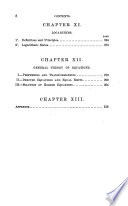 | William Guy Peck - Algebra - 1875 - 348 pages
...I 4 ___ 1 p 1 ' 3(ж — 2) — 2(ж — 1) + 6(ж + 1)' CHAPTER XI. LOGARITHMS. Definitions. 185. The logarithm of a number is the exponent of the power to which it is necessary to raise a fixed number to produce the given number. The fixed number is called the... | |
 | Benjamin Greenleaf - Trigonometry - 1876 - 204 pages
...ELEMENTS PLANE AND SPHERICAL TRIG0N0METRY; PRA6TI6AL APPLI6ATI0NS. TRIGONOMETRY, BOOK I. LOGARITHMS. 1. THE LOGARITHM of a number is the exponent of the power to which a given fixed number must be raised in order to produce the first number. 2. The BASE of the system is... | |
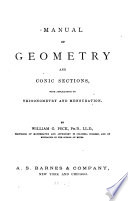 | William Guy Peck - Conic sections - 1876 - 412 pages
...proved. TRIGONOMETRY. I. INTRODUCTION— USE OF LOGARITHMS. DEFINITIONS AND EXPLANATIONS. 1. The common logarithm of a number is the exponent of the power to which it is necessary to raise 10 to produce the given number ; thus, 2 is the logarithm of 100, because... | |
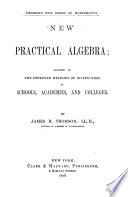 | James Bates Thomson - Algebra - 1878 - 322 pages
...ratio of f each second to infinity. Through what space would it move ? CHAPTER XIX. LOGARITHMS.* 436. The Logarithm of a number is the exponent of the power to which a given fixed number must be raised to produce that number. 437. This Fixed Number is called the Base... | |
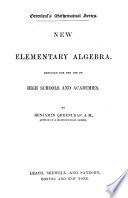 | Benjamin Greenleaf - Algebra - 1879 - 376 pages
...128, respectively, required the series. Ans. 1, 2, 4, 8, 16, 32, 64, 128. APPENDIX. LOGARITHMS. 350. The LOGARITHM of a number is the exponent of the power to which some constant number, called the base, must be raised to equal the number. Thus, suppose ax— m, then... | |
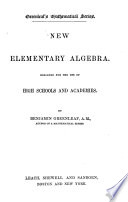 | Benjamin Greenleaf - 1879 - 346 pages
...geometrical progres sion are 1 and 128, respectively, required the series. APPENDIX. LOGARITHMS. S50. The LOGARITHM of a number is the exponent of the power to which some constant number, called the base, must be raised to equal the number. Thus, suppose crc=nj, then... | |
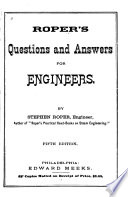 | Stephen Roper - Steam engineering - 1880 - 84 pages
...itself is squared. ft. Define the terms logarithms and hyperbolic logarithms, and explain their use. A. The logarithm of a number is the exponent of the power to which it is necessary to raise a fixed number in order to produce the first number. The use of logarithms... | |
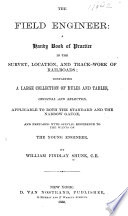 | William Findlay Shunk - Railroad engineering - 1880 - 362 pages
...Rise per mile of various grades 317 LOGAEITHMS. I.-II. LOGARITHMS. l. DEFINITIONS AND PEINCIPLES. 1. THE logarithm of a number is the exponent of the power to which it is necessary to raise a fixed number to produce the given number; that is to say, it represents... | |
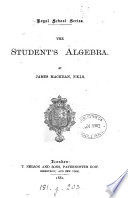 | James Mackean - 1881 - 510 pages
...a similar notation apply to y and x + y, then CHAPTER XIX. LOGARITHMS AND EXPONENTIAL THEOREM. 249. The logarithm of a number is the exponent of the power to which a second number, called the base, must be raised in order to produce the first. Thus, if N = a", then... | |
 | Henry Nathan Wheeler - Logarithms - 1882 - 60 pages
...VI., §§ 74, 78-82, 86, 89. LOGARITHMS. § 1. The logarithm of a number N is the exponent denoting the power to which a fixed number called the base must be raised in order to produce N. Thus, if N= V, then is logb N= x ; or, in words, when the base is b the logarithm of N is x. Whatislog28?... | |
| |